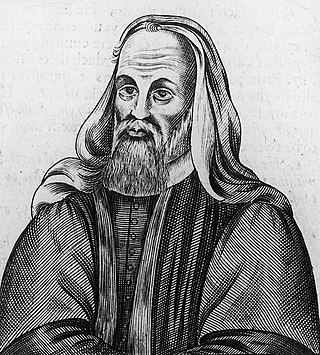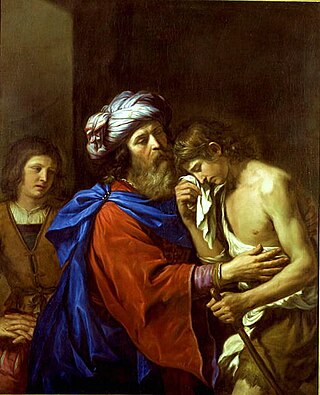Related Research Articles

Augustine of Hippo, also known as Saint Augustine, was a theologian and philosopher of Berber origin and the bishop of Hippo Regius in Numidia, Roman North Africa. His writings influenced the development of Western philosophy and Western Christianity, and he is viewed as one of the most important Church Fathers of the Latin Church in the Patristic Period. His many important works include The City of God, On Christian Doctrine, and Confessions.

Original sin is the Christian doctrine that holds that humans, through the fact of birth, inherit a tainted nature with a proclivity to sinful conduct in need of regeneration. The biblical basis for the belief is generally found in Genesis 3, in a line in Psalm 51:5, and in Paul's Epistle to the Romans, 5:12-21.

Predestination, in theology, is the doctrine that all events have been willed by God, usually with reference to the eventual fate of the individual soul. Explanations of predestination often seek to address the paradox of free will, whereby God's omniscience seems incompatible with human free will. In this usage, predestination can be regarded as a form of religious determinism; and usually predeterminism, also known as theological determinism.
Pelagianism is a Christian theological position that holds that the fall did not taint human nature and that humans by divine grace have free will to achieve human perfection. Pelagius, an ascetic and philosopher from the British Isles, taught that God could not command believers to do the impossible, and therefore it must be possible to satisfy all divine commandments. He also taught that it was unjust to punish one person for the sins of another; therefore, infants are born blameless. Pelagius accepted no excuse for sinful behaviour and taught that all Christians, regardless of their station in life, should live unimpeachable, sinless lives.

Concupiscence is an ardent longing, typically one that is sensual. In Christianity, particularly in Catholic and Lutheran theology, concupiscence is the tendency of humans to sin.

Pelagius was a British theologian known for promoting a system of doctrines which emphasized human choice in salvation and denied original sin. Pelagius was accused of heresy at the synod of Jerusalem in 415 and his doctrines were harshly criticized by Augustine of Hippo, especially the Pelagian views about mankind's good nature and individual responsibility for choosing asceticism. Pelagius especially stressed the freedom of human will. Very little is known about the personal life and career of Pelagius.
Semi-Pelagianism is a Christian theological and soteriological school of thought about the role of free will in salvation. In semipelagian thought, a distinction is made between the beginning of faith and the increase of faith. Semi-Pelagian thought teaches that the latter half – growing in faith – is the work of God, while the beginning of faith is an act of free will, with grace supervening only later. Semi-Pelagianism in its original form was developed as a compromise between Pelagianism and the teaching of Church Fathers such as Saint Augustine. Adherents to Pelagianism hold that people are born untainted by sin and do not need salvation unless they choose to sin, a belief which had been dismissed as heresy. In contrast, Augustine taught that people cannot come to God without the grace of God. Like pelagianism, semipelegianism was labeled heresy by the Western Church at the Second Council of Orange in 529.
Prevenient grace is a Christian theological concept that refers to the grace of God in a person's life which precedes and prepares to conversion. The concept was first developed by Augustine of Hippo (354–430), was affirmed by the Second Council of Orange (529) and has become part of Catholic theology. It is also present in Reformed theology, through the form of an effectual calling leading some individuals irresistibly to salvation. It is also in Arminian theology, according to which it is dispensed universally in order to enable people to respond to the offer of salvation, though it does not ensure personal acceptance.
Caelestius was the major follower of the Christian teacher Pelagius and the Christian doctrine of Pelagianism, which was opposed to Augustine of Hippo and his doctrine in original sin, and was later declared to be heresy.
Julian of Eclanum was bishop of Eclanum, near today's Benevento (Italy). He was a distinguished leader of the Pelagians of 5th century.

The history of the Calvinist–Arminian debate begins in early 17th century in the Netherlands with a Christian theological dispute between the followers of John Calvin and Jacobus Arminius, and continues today among some Protestants, particularly evangelicals. The debate centers around soteriology, or the study of salvation, and includes disputes about total depravity, predestination, and atonement. While the debate was given its Calvinist–Arminian form in the 17th century, issues central to the debate have been discussed in Christianity in some form since Augustine of Hippo's disputes with the Pelagians in the 5th century.

On the Bondage of the Will by Martin Luther argued that people can achieve salvation or redemption only through God, and could not choose between good and evil through their own willpower. It was published in December 1525. It was his reply to Desiderius Erasmus' De libero arbitrio diatribe sive collatio or On Free Will, which had appeared in September 1524 as Erasmus' first public attack on some of Luther's ideas.
Free will in theology is an important part of the debate on free will in general. Religions vary greatly in their response to the standard argument against free will and thus might appeal to any number of responses to the paradox of free will, the claim that omniscience and free will are incompatible.
De libero arbitrio diatribe sive collatio is the Latin title of a polemical work written by Desiderius Erasmus of Rotterdam in 1524. It is commonly called The Freedom of the Will or On Free Will in English.

In Christianity, sin is an immoral act and transgression of divine law. The doctrine of sin is central to the Christian faith, since its basic message is about redemption in Christ.

The Augustinian theodicy, named for the 4th- and 5th-century theologian and philosopher Augustine of Hippo, is a type of Christian theodicy that developed in response to the evidential problem of evil. As such, it attempts to explain the probability of an omnipotent (all-powerful) and omnibenevolent (all-loving) God amid evidence of evil in the world. A number of variations of this kind of theodicy have been proposed throughout history; their similarities were first described by the 20th-century philosopher John Hick, who classified them as "Augustinian". They typically assert that God is perfectly (ideally) good, that he created the world out of nothing, and that evil is the result of humanity's original sin. The entry of evil into the world is generally explained as consequence of original sin and its continued presence due to humans' misuse of free will and concupiscence. God's goodness and benevolence, according to the Augustinian theodicy, remain perfect and without responsibility for evil or suffering.
De libero arbitrio is one in a series of dialogues written by Lorenzo Valla. The work discusses his views on the concept of free will as it pertains the Catholic Church's opinion on predestination at the time. The concept of predestination, in the opinion of the Catholic Church, deals with the fact that God knows how we will act and has predetermined our eternal destination. Many philosophers of the time argued that if humans' lives are in fact predetermined by God, than in reality the concept of free will is simply an illusion. Essentially the argument is that if God has created us already knowing the decisions we will make, than those decisions are not actually ours. Valla, through a fictional dialogue amongst the work's characters, defends the idea that the concepts of predetermination and free will can coexist. In the work, Valla states that he is attempting to directly refute the works of the 6th century philosopher Boethius.

Augustinianism is the philosophical and theological system of Augustine of Hippo and its subsequent development by other thinkers, notably Boethius, Anselm of Canterbury and Bonaventure. Among Augustine's most important works are The City of God, De doctrina Christiana, and Confessions.

Augustinian Calvinism is a term used to emphasize the alleged origin of John Calvin's theology within Augustine of Hippo's theology over a thousand years earlier. By his own admission, John Calvin's theology was deeply influenced by Augustine of Hippo, the fourth-century church father. Twentieth-century Reformed theologian B. B. Warfield said, "The system of doctrine taught by Calvin is just the Augustinianism common to the whole body of the Reformers." Paul Helm, a well-known Reformed theologian, used the term "Augustinian Calvinism" for his view in the article "The Augustinian-Calvinist View" in Divine Foreknowledge: Four Views.

Catholic hamartiology is a branch of Catholic thought that studies sin. According to the Catholic Church, sin is an "utterance, deed, or desire," caused by concupiscence, that offends God, reason, truth, and conscience. The church believes sin is the greatest evil and has the worst consequences for the sinner, the world, and the l Catholic Church itself. Based on the Bible, the Catholic Church distinguishes between two kinds of sins: mortal sin and venial sin. The Catholic Church also distinguishes between the state of being in original sin and the commission of actual sin.
References
- ↑ Hackstaff, L. H.; Benjamin, Anna S. (1964). Augustine: On Free Choice of the Will . Bobbs-Merrill. pp. xx–xxiv.
- ↑ Chadwick, Henry (2004). "Augustine" . In Young, F.; Ayres, L.; Louth, A. (eds.). The Cambridge History of Early Christian Literature. Cambridge University Press. pp. 330–331. ISBN 0-521-46083-2.
- 1 2 Roberts, David E. (July 1953). "Augustine's Earliest Writings". The Journal of Religion. 33 (3): 175. doi: 10.1086/484434 . JSTOR 1200461. S2CID 170604855.
- ↑ Hackstaff & Benjamin 1964 , p. ix
- ↑ Burns, Daniel E. (2015). "Augustine's Introduction to Political Philosophy: Teaching De Libero Arbitrio, Book I". Religions. 6 (1): 82–91. doi: 10.3390/rel6010082 .
- ↑ Beversluis, John (2000). Cross-Examining Socrates: A Defense of the Interlocutors in Plato's Early Dialogues. Cambridge University Press. p. 21. ISBN 978-0-521-55058-1.
- ↑ Hackstaff & Benjamin 1964 , p. xxvi
- ↑ Hackstaff & Benjamin 1964 , p. 1
- ↑ Hackstaff & Benjamin 1964 , p. 10
- ↑ Hackstaff & Benjamin 1964 , p. 15
- ↑ Hackstaff & Benjamin 1964 , p. 71
- ↑ Hackstaff & Benjamin 1964 , p. 95
- ↑ Chadwick 2004 , pp. 333–334
- ↑ Evans, G. R. (1999). "Evil". In Fitzgerald, Allan D. (ed.). Augustine Through the Ages. William B. Eerdmans. pp. 342–343. ISBN 0-8028-3843-X.
- ↑ Bonner, Gerald (1999). "Augustine and Pelagianism" . In Ferguson, Everett (ed.). Doctrinal Diversity: Varieties of Early Christianity. Garland Pub. pp. 217–220. ISBN 978-0-8153-3071-4.
- ↑ Holmes, P. (1948). "On Nature and Grace" . In Oates, Whitney J. (ed.). Basic Writings of Saint Augustine. Vol. 1. Random House. p. 575–7 (ch. 80–81).
- ↑ Hackstaff & Benjamin 1964 , p. 155
- ↑ Dodaro, Robert (2004). Christ and the Just Society in the Thought of Augustine. Cambridge University Press. pp. 82–83. ISBN 978-1-139-45651-7.
- ↑ "Question 96: The power of human law". Summa Theologica. Retrieved 7 February 2022– via New Advent.
Further reading
- Harrison, Simon (2006). Augustine's Way into the Will: The Theological and Philosophical Significance of De libero arbitrio. Oxford University Press.